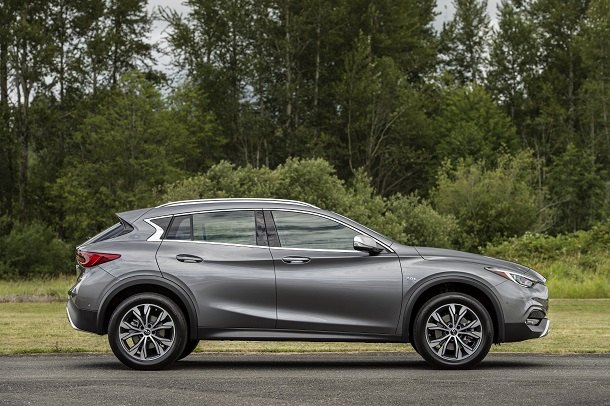Infiniti Calls It Quits in Western Europe, Kills Off the QX30 for Everyone Else

Western Europe doesn’t like Infiniti very much, so the Japanese premium brand has decided to hit the road. The brand’s residency in the competitive region only lasted a decade, and middling consumer interest, coupled with increasingly stringent emissions regulations, is all the reason it needs to take a hike.
In doing so, Nissan’s premium division plans to cease global production of the QX30 at its Sunderland, England assembly plant. The subcompact crossover, born of a rocky Mercedes-Benz partnership, and its overseas-only Q30 hatch sibling go belly-up in July of this year.
The QX30’s discontinuation was foretold.
At January’s Detroit Motor Show, Infiniti President Christian Meunier told Motor Authority, “(The QX30 is) not a very successful product. We’ll keep selling it for now…but this is not a product that has a future beyond its current life. It will be replaced in the future by an all-Infiniti platform.”
Suffice it to say that the partnership that spawned the QX30 and Mercedes-Benz GLA class didn’t really do it for Infiniti.
As for the Infiniti brand itself, customers in Western Europe and the UK continued to fine alternatives much more enticing. The brand, which launched there in 2008, will bow out completely by early 2020, the automaker said. In the wake of this decision, Infiniti will renew its efforts in more receptive markets like the U.S. and China, while maintaining operations in Eastern Europe, the Middle East, and Asia.
“Western Europe remains the most challenging and competitive region for premium cars,” Infiniti spokesman Trevor Hale told Reuters. The brand’s sales in the region sunk to 5,800 vehicles last year — roughly half of what it sold the year before.
In comparison, Infiniti sold 149,280 vehicles in the U.S. last year, only 8,101 of which were QX30s. That’s a 42.5 percent sales drop from 2017. The model first appeared in the U.S. in October of 2016.
Devoid of the plug-in hybrids and electrics European lawmakers and regulators like, Infiniti faced a future where it would need to invest heavily in green tech to stay in the region’s good books. It’s not worth the effort, the company claims.
“The commercial reality for Infiniti in western Europe is that there is simply no visibility of a viable and sustainable business, especially given the regulatory challenges,” Hale said.
[Images: © Timothy Cain/The Truth About Cars, Infiniti]

More by Steph Willems
Latest Car Reviews
Read moreLatest Product Reviews
Read moreRecent Comments
- Lou_BC A pickup for most people would be a safe used car bet. Hard use/ abuse is relatively easy to spot and most people do not come close to using their full capabilities.
- Lorenzo People don't want EVs, they want inexpensive vehicles. EVs are not that. To paraphrase the philosopher Yogi Berra: If people don't wanna buy 'em, how you gonna stop 'em?
- Ras815 Ok, you weren't kidding. That rear pillar window trick is freakin' awesome. Even in 2024.
- Probert Captions, pleeeeeeze.
- ToolGuy Companies that don't have plans in place for significant EV capacity by this timeframe (2028) are going to be left behind.



































Comments
Join the conversation
Infiniti is just the wrong name for conjuring up a sense of prestige. Maybe Nissan need to start a new prestige brand with a worthwhile name. Infiniti are just blinged Nissans. I think all prestige and luxury marques need their own platforms to set them apart from the riff raff lower offerings.
I’m calling this being a minor collectible for weirdos in the coming years in the same vein as the Acura ZDX